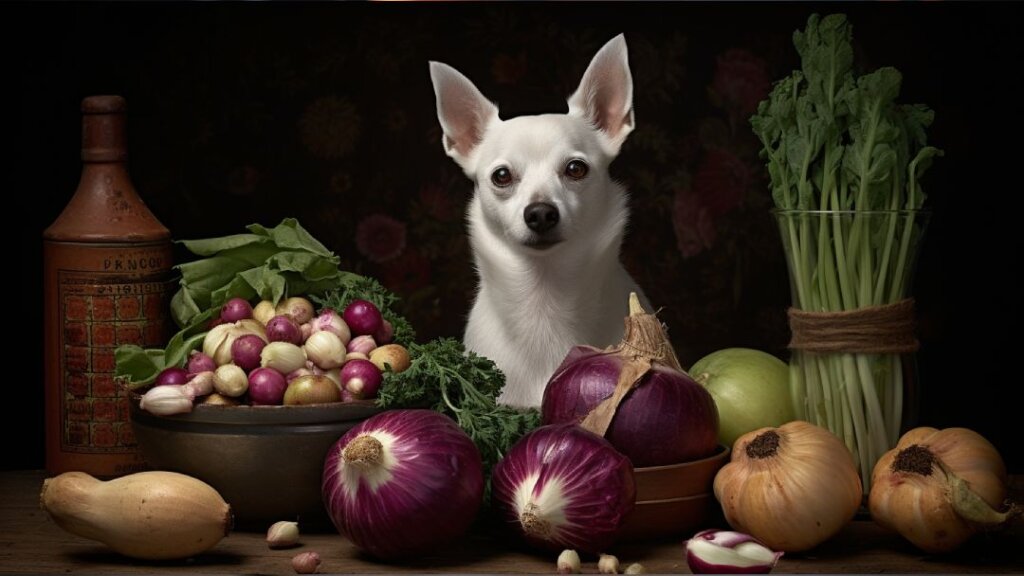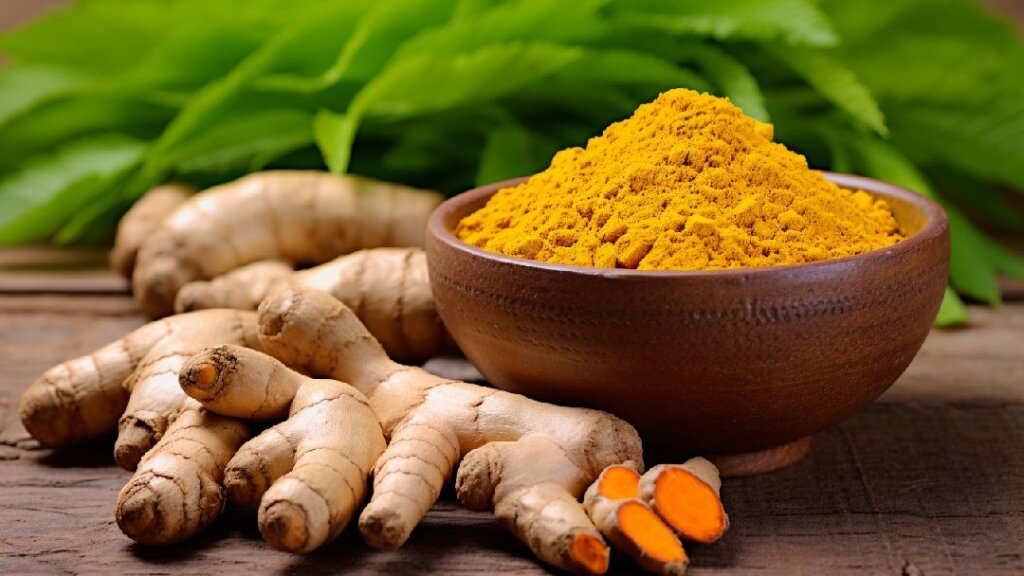Cooking for your dog can be a joyous experience, and adding a sprinkle of spices to their meals might be tempting.
Let’s explore the canine culinary world, highlighting dog-friendly herbs and spices that can elevate your dog’s dining experience while keeping them healthy and happy.
Exploring 10 Safe Herbs and Spices for Dogs
Let’s journey through 10 safe herbs for dog meals, understanding how each can contribute to your furry friend’s well-being.
Not all spices are created equal, and it’s crucial to understand which ones can enhance your pup’s meals and which ones should be avoided.
1. Ginger for Dogs
Known for its anti-inflammatory properties, ginger can be a game-changer for dogs with digestive issues. From alleviating nausea to reducing bloating, ginger is a natural remedy that adds flavor and health benefits to your dog’s diet.
2. Turmeric: The Golden Spice
Curcumin, the active compound in turmeric, boasts powerful anti-inflammatory effects. Ideal for dogs with arthritis or joint pain, turmeric can also enhance the immune system and aid digestion, making it a versatile and valuable addition to your pup’s meals.
3. Cinnamon Health Benefits
Cinnamon isn’t just a delightful spice; it also offers health perks for dogs. Cinnamon can be beneficial with antimicrobial properties and the ability to regulate blood sugar levels, but moderation is key due to potential coumarin content.
4. Parsley: Fresh Breath and More
Beyond its breath-freshening properties, parsley is rich in vitamins and antioxidants. It can support your dog’s immune system and contribute to overall health when included in moderation.
5. Basil for Canine Cuisine
Basil brings a burst of flavor and a dose of antioxidants to your dog’s dish. While safe in small amounts, it’s essential to moderate basil consumption to prevent any adverse effects.
6. Dill: A Delightful Herb
Adding a hint of dill to your dog’s meals enhances the taste and provides essential vitamins and minerals. As with any spice, moderation is key to avoiding potential digestive issues.
7. Oregano’s Antioxidant Boost
Oregano isn’t just for pizza; it can be a flavorful and antioxidant-rich addition to your dog’s diet. Be cautious with the quantity, ensuring it complements rather than overwhelms their meals.
8. Minty Freshness with Mint
Mint offers more than a refreshing flavor. It can aid digestion, soothe upset stomachs, and be a natural insect repellent for your furry friend.
9. Rosemary: Aromatic and Beneficial
Beyond its aromatic qualities, rosemary contains antioxidants supporting your dog’s immune system. Like other herbs, moderation is essential to prevent potential issues.
10. Thyme for Health
Thyme not only adds a savory touch but also provides vitamins and minerals. Use it sparingly to enhance your dog’s meals without overwhelming their palate.

5 Unsafe Herbs and Spices for Dogs Meals
While the canine spice palette offers many benefits, some herbs and spices can harm your dog’s health.
1. Nutmeg: A Potentially Toxic Spice
Nutmeg, commonly used in baking, contains myristicin, a compound that can lead to hallucinations, disorientation, and seizures in dogs. It’s best to avoid nutmeg when preparing meals for your pup.
2. Cinnamon Caution
While cinnamon in moderation can be beneficial, excessive consumption can lead to low blood sugar levels (hypoglycemia) and, in some cases, liver damage. Ensure you’re mindful of the amount of cinnamon used in your dog’s meals.
3. Chili and Jalapeño Heat
Spices like chili and jalapeño may add a kick to human dishes, but they can cause digestive distress in dogs. The intense heat can lead to stomach upset, vomiting, and discomfort. Keep these spicy additions far from your dog’s bowl.
4. Garlic: A Flavorful Foe
While garlic is often used in human cuisine, it contains compounds that can be toxic to dogs, particularly in larger quantities. Prolonged exposure can lead to serious health issues, so skipping the garlic seasoning for your pup is safer.
5. Onion Dangers
Onions (raw, cooked, or powdered) can harm dogs. They contain compounds that can cause damage to red blood cells, leading to anemia. Ensure your dog’s meals are onion-free to safeguard their health.

Health Benefits for Dogs
Understanding the health benefits of various ingredients is crucial for optimal care for our canine companions. Let’s explore the nutritional bounty that contributes to their well-being.
- Essential Nutrients
- Protein: Crucial for muscle development and repair.
- Carbohydrates: A primary energy source for active dogs.
- Fats: Important for a healthy coat and skin.
- Vitamins and Minerals: Contribute to various bodily functions.
Dogs appreciate a variety of flavors in their meals. Introducing dog-friendly spices not only enhances the taste but also provides potential health benefits.
Dos and Don’ts: Adding Spices to Your Dog’s Diet
Incorporating spices into your dog’s diet requires careful consideration to ensure their well-being. It’s essential to be aware of the dos and don’ts:
Dos
- Start Small and Gradual Introduction
Begin by introducing spices in small quantities. Start with a tiny amount and gradually increase it over time. This allows your dog to adjust to the new flavors.
- Choose Dog-Friendly Spices
Opt for spices that are known to be safe for dogs. Ginger, turmeric, and cinnamon are examples of dog-friendly spices.
- Monitor for Allergic Reactions
Keep a close eye on your dog for any signs of allergic reactions. Watch for symptoms such as itching, swelling, or gastrointestinal issues.
- Incorporate Fresh Ingredients
Whenever possible, use fresh ingredients. Freshly grated ginger, for instance, is more potent than dried ginger.
- Seek Professional Guidance
Consult with your veterinarian before introducing new spices to your dog’s diet, especially if your dog has pre-existing health conditions.
Don’ts
- Avoid Toxic Spices
Use spices that are known to be toxic to dogs. Common kitchen spices like nutmeg can be harmful and should be strictly avoided.
- No Excessive Amounts
Don’t overwhelm your dog with excessive amounts of spices. Too much of a good thing can be harmful. Stick to moderation, and remember that dogs have different tolerance.
- Steer Clear of High Sodium Spices
Don’t use spices that are high in sodium. Excessive salt intake can lead to health issues such as dehydration and electrolyte imbalance.
- Avoid Spices Harmful to Certain Conditions
Don’t Include spices that may exacerbate specific health conditions. For instance, if your dog has kidney issues, certain spices may not be suitable.
- Don’t Force Spice Consumption
Don’t force your dog to consume spices if they shows reluctance. Not all dogs have the same palate, and some may not enjoy the added flavors.

So, sensibly spice up your dog’s meals and savor the joy of cooking for your loyal companion.

FAQs
How much ginger can I safely give my dog?
Start small and gradually introduce ginger into your dog’s meals. A few pieces of freshly grated ginger daily, or homemade treats with ginger, can aid digestion.
Are there spices that can help with my dog’s joint health?
Turmeric, with its anti-inflammatory properties, can benefit dogs with arthritis. Start with a small amount and monitor your dog’s response.
Can I use dried spices instead of fresh ones?
Fresh is often more potent than dried. Use freshly grated ginger for maximum benefits. If using dried spices, start with smaller amounts, as they are less potent.
Can dogs eat spicy food like humans?
Dogs have sensitive stomachs, so avoiding overly spicy foods is best. However, incorporating mild, dog-friendly spices can add flavor without causing digestive issues.
Can I give my dog turmeric every day?
The recommended dosage is typically 1/2 teaspoon per 10 pounds of body weight twice daily. Consider your dog’s diet and consult your vet to determine the right amount.






my dog loves to smell rosemary but only smell nothing more
I love cooking, and it’s good to know that a little turmeric or ginger is actually beneficial for my pup